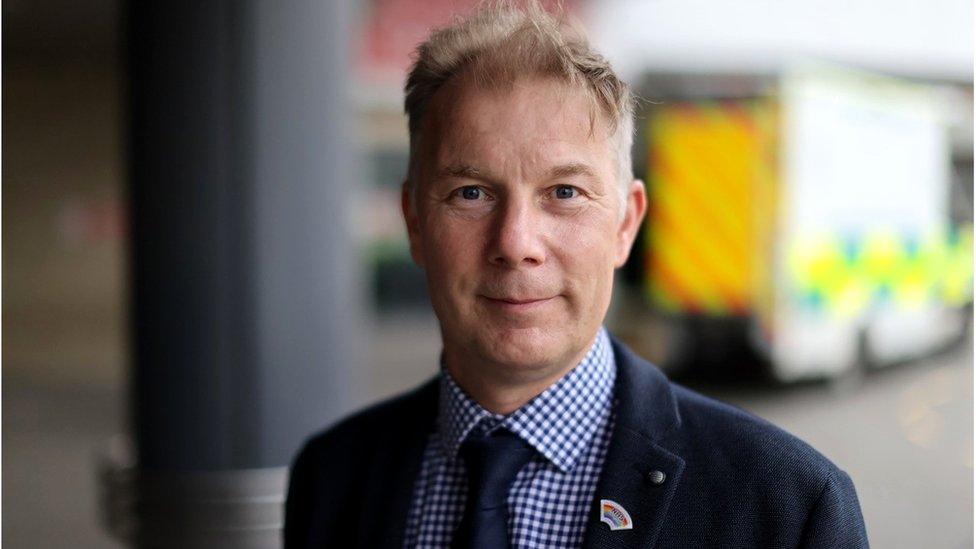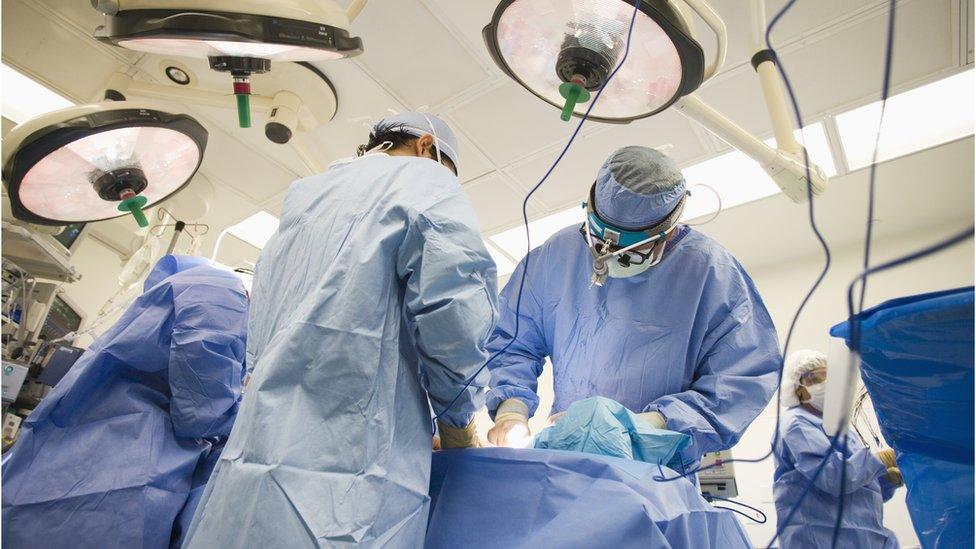More than 550,000 on Scottish hospital waiting lists
- Published

Ruth Mitchell has finally had her knee op after a year and a half on a waiting list
The number of people on hospital waiting lists in Scotland increased by almost 15,000 in three months, according to the latest figures, external.
More than 553,000 were waiting for outpatients or inpatients treatment at the end of March, equivalent to about one in 10 of the population.
The waiting list number is the highest since statistics were recorded in their current form about a decade ago.
And almost one in nine had been waiting for more than a year.

The number waiting for treatment for planned procedures such as knee or hip operations has increased by more than a third since the Covid pandemic began in March 2020.
The number of patients being seen in Scotland has increased slightly but is still well down on the levels before the Covid pandemic.
Recent figures for NHS England showed six million people on waiting lists, a slightly higher rate than Scotland.
The latest statistics for Wales and Northern Ireland show much longer waiting lists.

'It is going to take years'

Consultant Andy Ballantyne said the situation had deteriorated rapidly
Andy Ballantyne is a consultant in trauma and orthopaedics at the Victoria Hospital in Kirkcaldy.
He said the situation had deteriorated rapidly.
Mr Ballantyne said: "In 2019 we were having conversations with patients about joint replacements and telling them that they can expect to have surgery in 12 weeks. And we were attaining that for most patients in Fife at that time.
"But since the Covid pandemic and the suspension of planned operating, we are now having discussions about patients waiting for six to 12 months for surgery.
"It is going to take years, I think, to get back to the 2019 waiting times."
Mr Ballantyne said the patients he was seeing now had more severe disease requiring more complex reconstructive surgery. He said this reflected the length of time some patients had been waiting.


Doctors are being asked to prioritise patients whose condition is more serious but it leaves many lower down the list in limbo - and often in pain.
These are the patients who might struggle to work or keep active but for whom a new hip or knee would dramatically improve their quality of life. Some surgeons would like to see additional resources devoted to getting long waits for this group of patients down.
But hospitals are still unable to work at full capacity, staff are dealing with growing numbers of complex cases and even without a pandemic there was always going to be a rise in those requiring planned healthcare.
There are no easy answers - there are simply too many people in need and not enough capacity.

'The pain is excruciating'
David Fleming says he was "gutted" that his operation was cancelled due to the Covid backlog
David Fleming, a 62,-year-old joiner from Dunfermline, cannot work while he waits for a hip replacement.
He is also on a waiting list for a knee replacement which was caused by the strain of his hip damage.
Mr Fleming was sent a letter with a date for his operation but it came with a sticker saying it was cancelled due to the Covid backlog.
He is struggling with the long wait.
"The pain is excruciating," he said. "I get about two hours sleep a night. I used to go to the shop, do my garden.
"It feels degrading because you can't do the things you used to do and it gets frustrating. It's a lonely life. I sit here or lie over there most days."

'I am feeling a lot better now'
Ruth Mitchell says surgery means a 'normal life' after months of pain
Ruth Mitchell is one of the lucky ones - after about 18 months on a waiting list she had her knee joint replaced last week.
"I am feeling a lot better now because while I was waiting to come in my knee was giving way under me so I was forever falling," she said. "I was so excited to get the news that I was coming in."
The 75-year-old shattered her knee when she fell crossing the road. She has been unable to take her dog out for walks, as she loved to do, and would not go very far without someone with her, in case she fell.
"I had to wait about a year and a half," she said.
"With Covid, you have to try to accept that but at the same time it is quite annoying because of the pain I was in. But I am here now and I've had it done."

Key diagnostic tests
More Public Health Scotland statistics released on Tuesday, external showed 155,405 patients were waiting to be seen for the eight key diagnostic tests in the NHS - four endoscopy tests including colonoscopy and four radiology tests including CT scans and MRI scans.
The latest figures show numbers have gone up 10% in the first three months of the year and are 75% higher than the average before the pandemic.
David Ferguson, public affairs manager for Cancer Research UK in Scotland, said: "It is unacceptable that people in Scotland are waiting too long for a test to determine whether they have cancer.
"Early diagnosis followed by swift access to the most effective treatment can save lives."
Related topics
- Published22 February 2022
